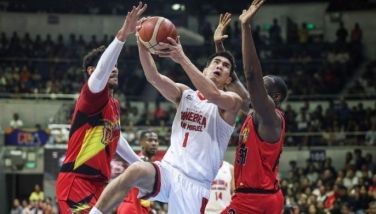Athletes need to be insulated from dark agendas
Before anything else, allow me to greet everyone a Blessed Christmas!
After 11 days of intense competitions and controversies, the 27th Southeast Asian (SEA) Games drew to a close on Sunday at Wunna Theikdi Stadium, where it began on Dec. 11. Naypyidaw (officially spelled Nay Pyi Taw and pronounced “Neepidoâ€, very much like “libidoâ€, as pointed out in jest for ease of pronunciation by Dr. Brawner of the Philippine Center for Sports Medicine), the third largest city in Myanmar, next to Yangon and Mandalay, hosted the Games. The 27th edition of the Games, marked Burmese’s return as hosts after they welcomed the Games then known as the Southeast Asian Peninsular (SEAP) Games in 1969 for the first time. The host city is about six hours by land and two hours by turbo prop from Yangon (Rangoon).
As expected, Nay Pyi Taw, aided by generous Chinese support, staged a show befitting its desire to demonstrate to the world Myanmar’s emergence from military rule toward a slow and albeit, deliberate shift towards democracy. The hosting of the Games, after years of near-isolation, is a prelude to Myanmar’s chairing in 2014, the 10-member ASEAN, which is itself pushing hard for economic integration by 2015. The massive support of the Chinese has certainly resulted in creating another sympathetic ally within ASEAN for China which has continues to flex its muscles by announcing its ownership of certain territories claimed by the Philippines, Vietnam, Malaysia and Brunei. With Cambodia already in its fold, China has further cemented its foothold in ASEAN.
In its Dec. 16-22, 2013 issue, The Myanmar Times featured a report from the AFP (Agence France Press) which quotes Onh Myint Oo, one of the (opening) ceremonies key organizers, “People are happy across the country. They had tears in their eyes. It was the best opening ceremony at any SEA Games. We are grateful to the Chinese for their help with the opening ceremony.â€
The report states that China provided nearly $33 million (about P1.5 billion) in technical assistance for the Games, including the opening and closing ceremonies. The opening ceremony took place at the 30,000-seat stadium (which we daresay after several visits, is far more modern than any of the Philippines’ track ovals), one of several new venues built in the capital for the Games. Three-star hotels have also sprouted to host not only SEA Games officials and spectators but the heavy influx of business people who see Myanmar as the last frontier in Southeast Asia. In one five-kilometer stretch in the main four-lane (in each direction) highway of the capital, we spotted at least 20 hotels ready to welcome visitors.
In its desire to galvanize the national spirit and gain the respect of the international community, Myanmar engaged in a form of soft power diplomacy through sports. It did not therefore hesitate, like any other SEA Games host, to tilt the Games in its favor by introducing events only Myanmar plays.
At the outset, Myanmar made known its goal of winning 100 of the 460 gold medals at stake in the 35 sports played in the Games. And for a while Myanmar managed to rattle the Thais which have won the unofficial overall championship 11 times (against Indonesia’s 10) when Myanmar threatened to dominate the last three days of competitions. It was during this period when the unknown sports were still to be played out and Myanmar was heavily favored to sweep sports like chinlone, a traditional Burmese sport and dance. We are told that it is similar to the Philippines’ sipa and sepak takraw.
In the end, Myanmar finished with 78 gold medals, behind the Thais who captured 101. Vietnam, a war-torn country not too long ago, had 72; followed by Indonesia with 64; Malaysia, 41; tiny Singapore, 34; and the Philippines with 29, for seventh place, its lowest ever ranking since it was admitted into the SEAG in 1979 together with Brunei and Indonesia. Prior to the admission of the three countries, there were only 12 sports in the Games with no more than 500 athletes taking part. Now, the Games have become a logistical nightmare with thousands of athletes and officials in attendance. The next Games, in 2015, will be held in Singapore with Malaysia, Brunei, Vietnam and Cambodia hosting in 2017, 2019, 2021 and 2023, respectively.
The athletics delegation of 24 athletes and nine coaches, benefitting from the hard work and care given over the years by PATAFA president Go Teng Kok and local coaches like Joseph Sy, supplemented by overseas coaches like Ryan Flaherty, pocketed six gold medals courtesy of Henry Dagmil in the long jump; Archand Christian Bagsit (400 meters); Eric Shauwn Cray (400 meter hurdles); Christopher Ulboc (3000 meter steeplechase); Jesson Ramil Cid (decathlon) and the 4 x 400 men’s relay team. I had the chance to award the gold medal to Cray in Nay Pyi Taw and to meet all the PATAFA athletes at least twice: on Dec. 9 during the send-off we jointly hosted with Go before they departed for Myanmar and on Dec. 18 at the athletes’ village over dinner.
The present PATAFA crop of athletes is a dedicated bunch and, should, if properly trained and supported and insulated from politics and inappropriate interference from parties with dark agendas, be able to do much more.
- Latest
- Trending




























